Unit 7 Will people have robots? Section A Grammar Focus-3c 课件 (共28张PPT)
文档属性
| 名称 | Unit 7 Will people have robots? Section A Grammar Focus-3c 课件 (共28张PPT) | 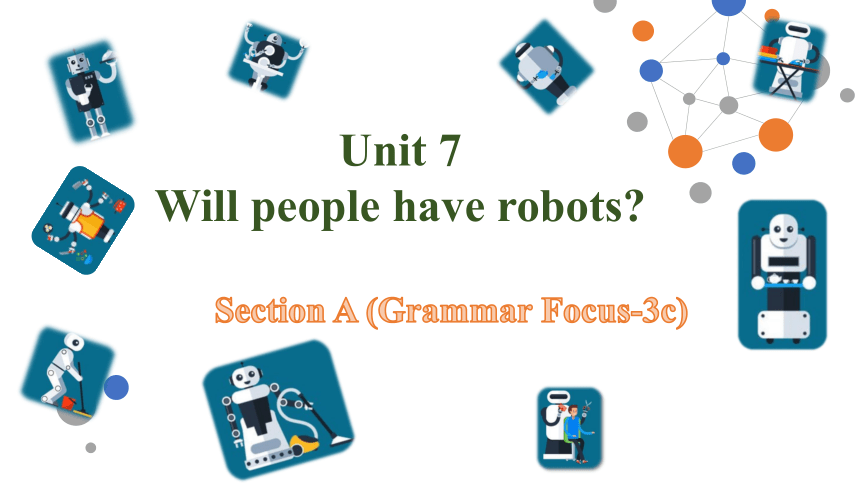 | |
| 格式 | pptx | ||
| 文件大小 | 2.5MB | ||
| 资源类型 | 教案 | ||
| 版本资源 | 人教新目标(Go for it)版 | ||
| 科目 | 英语 | ||
| 更新时间 | 2022-11-20 17:38:07 | ||
图片预览

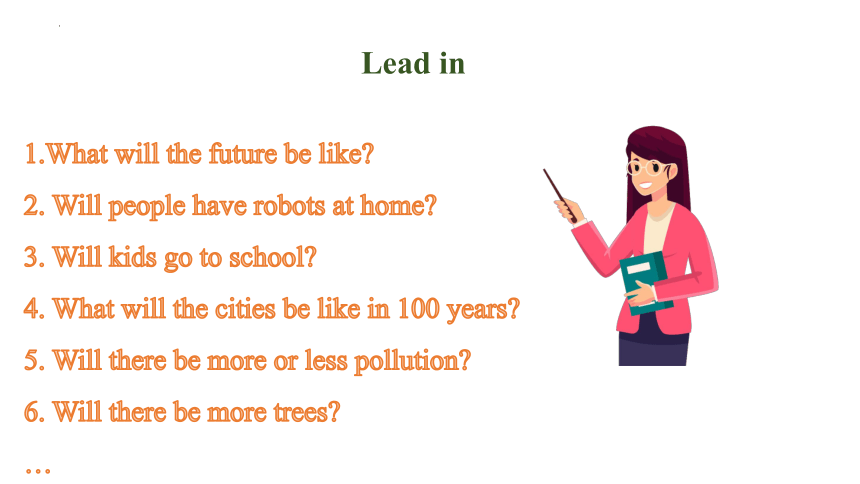
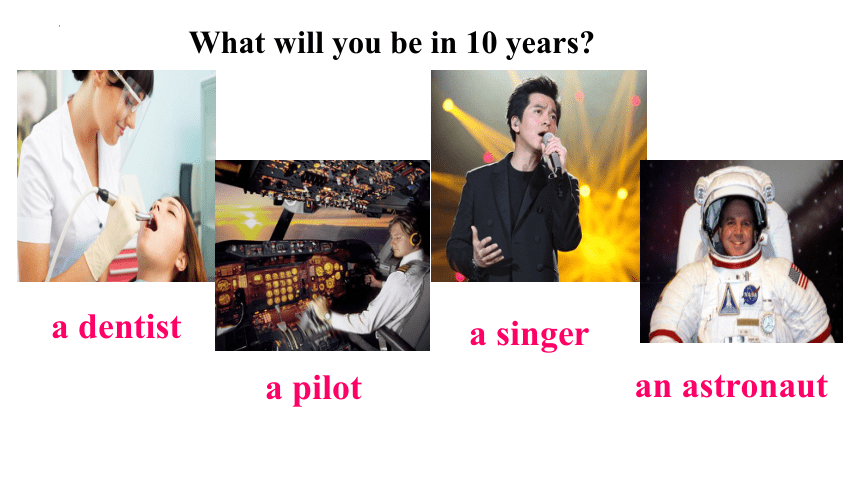
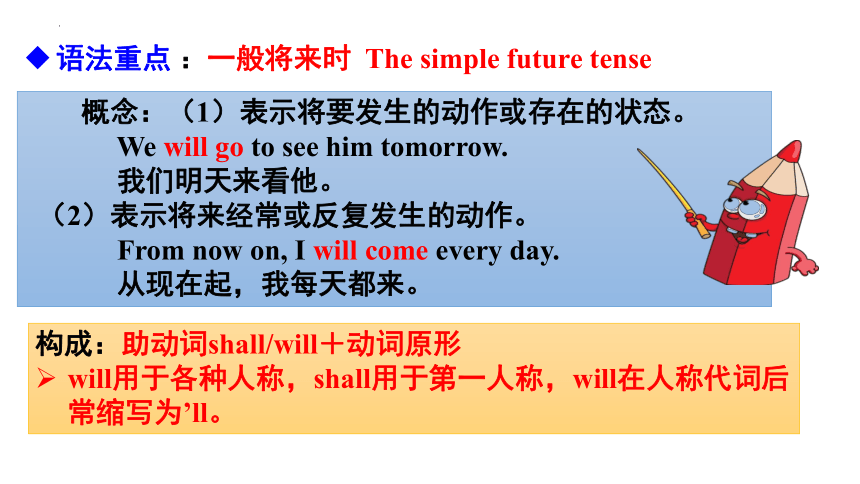
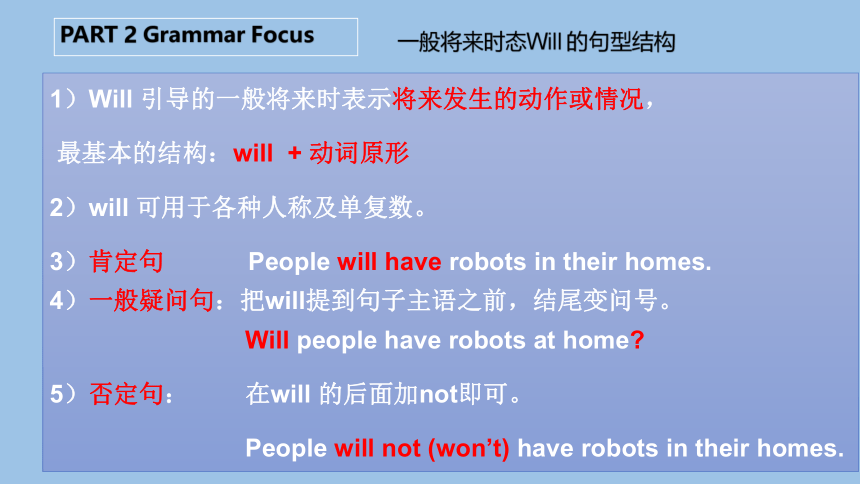
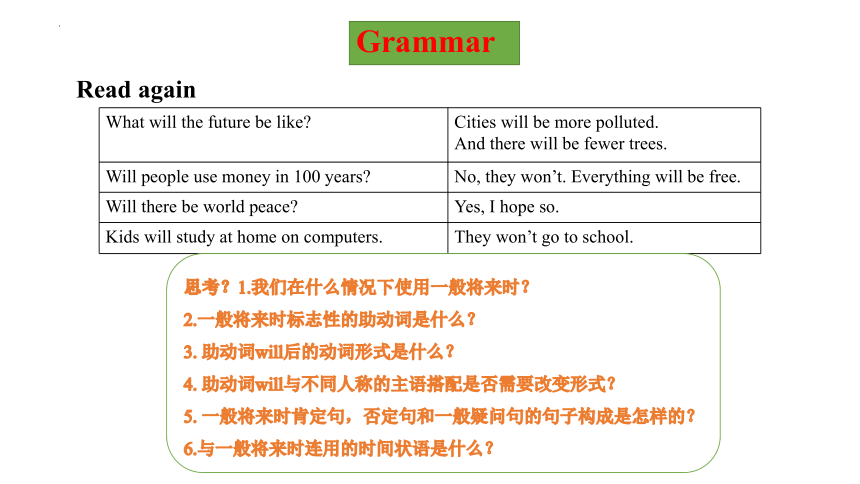
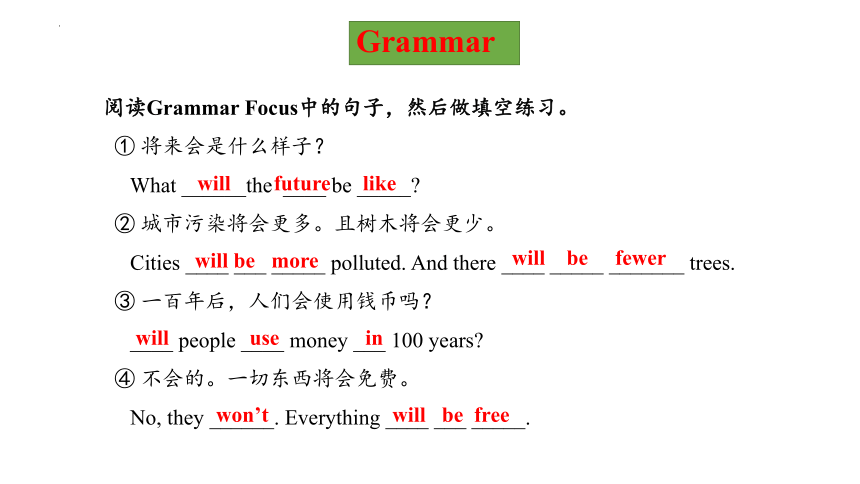
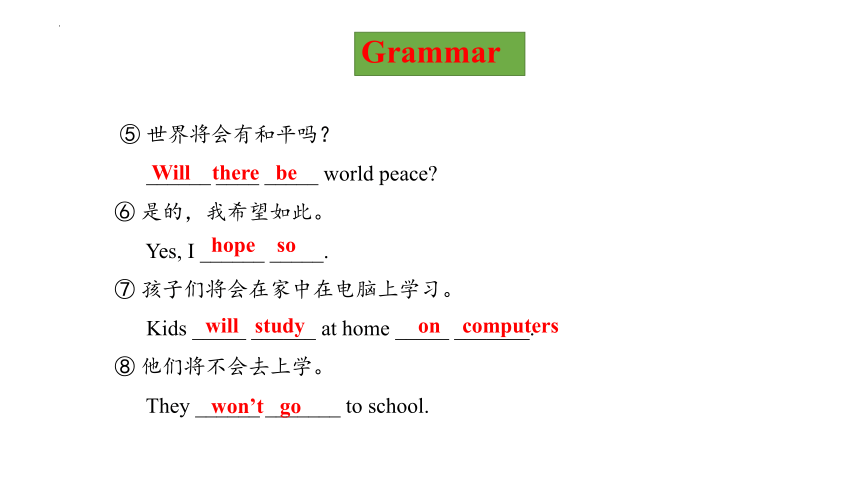
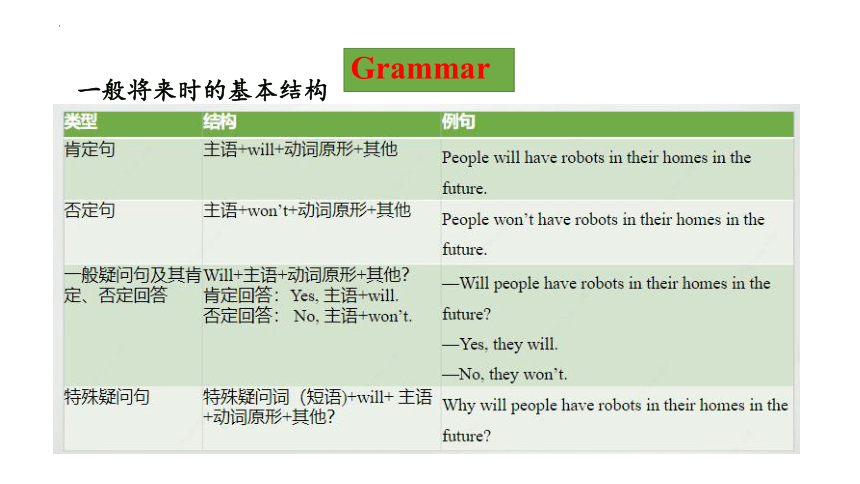
文档简介
(共28张PPT)
Unit 7
Will people have robots
Unit 7
Will people have robots
Section A
Grammar Focus---3c
Section A (Grammar Focus-3c)
Lead in
1.What will the future be like
2. Will people have robots at home
3. Will kids go to school
4. What will the cities be like in 100 years
5. Will there be more or less pollution
6. Will there be more trees
…
a dentist
a pilot
a singer
an astronaut
What will you be in 10 years
语法重点 :一般将来时 The simple future tense
概念:(1)表示将要发生的动作或存在的状态。
We will go to see him tomorrow.
我们明天来看他。
(2)表示将来经常或反复发生的动作。
From now on, I will come every day.
从现在起,我每天都来。
构成:助动词shall/will+动词原形
will用于各种人称,shall用于第一人称,will在人称代词后常缩写为’ll。
PART 2 Grammar Focus
一般将来时态Will 的句型结构
1)Will 引导的一般将来时表示将来发生的动作或情况,
最基本的结构:will + 动词原形
2)will 可用于各种人称及单复数。
3)肯定句 People will have robots in their homes.
4)一般疑问句:把will提到句子主语之前,结尾变问号。
Will people have robots at home
5)否定句: 在will 的后面加not即可。
People will not (won’t) have robots in their homes.
What will the future be like Cities will be more polluted.
And there will be fewer trees.
Will people use money in 100 years No, they won’t. Everything will be free.
Will there be world peace Yes, I hope so.
Kids will study at home on computers. They won’t go to school.
Read again
思考?1.我们在什么情况下使用一般将来时?
2.一般将来时标志性的助动词是什么?
3. 助动词will后的动词形式是什么?
4. 助动词will与不同人称的主语搭配是否需要改变形式?
5. 一般将来时肯定句,否定句和一般疑问句的句子构成是怎样的?
6.与一般将来时连用的时间状语是什么?
Grammar
阅读Grammar Focus中的句子,然后做填空练习。
① 将来会是什么样子?
What ______the ____ be _____
② 城市污染将会更多。且树木将会更少。
Cities ____ ___ _____ polluted. And there ____ _____ _______ trees.
③ 一百年后,人们会使用钱币吗?
____ people ____ money ___ 100 years
④ 不会的。一切东西将会免费。
No, they ______. Everything ____ ___ _____.
will future like
will be more
will be fewer
will use in
won’t will be free
Grammar
⑤ 世界将会有和平吗?
______ ____ _____ world peace
⑥ 是的,我希望如此。
Yes, I ______ _____.
⑦ 孩子们将会在家中在电脑上学习。
Kids _____ ______ at home _____ _______.
⑧ 他们将不会去上学。
They ______ _______ to school.
Will there be
hope so
will study on computers
won’t go
Grammar
一般将来时的基本结构
Grammar
Grammar
be going to与will都可表示将要发生的事或将要去做的事,但有如下几点区别:
be going to will 例句
表示近期就要发生的事情。 表示较 远的将 来时间 发生的事。 He is going to write a letter tonight.
他今晚将要写信。
He will write a book one day.
他有朝一日会写本书。
根据主观判断将来肯定会发生的事情。 客观上势必发生的 事情。 He eats too much and he is going to be fat.
他吃得太多,他将会胖的。
He will be twenty years old.
他就要20岁了。
含有“计划、准备”的意思。 will无 此意。 She is going to lend us her book.
她计划把她的书借给我们。
He will be here in half an hour.
他将在半小时后到这儿。
Grammar
Fill in the blanks with more, less or fewer.
1. In the future , there will be ________fresh water
because there will be ________pollution in the sea.
2.In 100 years, there will be________ cars because there
will be ________ people in the cities.
3.There will be________ jobs for people because
________robots will do the same jobs as people.
4.I think there will be ________cities because
people will build ________buildings in the country.
5.In 50 years, people will have ________free time
because there will be ________things to do.
less
more
more
more
fewer
more
more
more
more
fewer
in the future 未来;在将来
指距离现在时间较长的将来的某一时间
in future 今后;从今以后
指距离现在时间较短的将来的某一时间,相当于from now on
I will work hard in future.从今往后我要努力工作。
3a
Complete the predictions with what you think will happen.
1.Kids study at school now. In 100 years,
_________________________________________
2.I sometimes see blue skies in my city,but in the
future_______________
3.People now usually live to be about 70-80 years old,
but in the future______________
4.Families usually spend time together on weekends, but
maybe in 200 years __________________________
they will study at home on computers.
they will live to be 200 years old.
we can hardly see blue skies.
they will live alone.
3b
Draw a picture of what you think a city in the future will be like. Then describe it to the class.
3c
I think there will be more tall buildings, and there will be fewer cars and more buses.
there be句型的一般将来时
(1)there be 句型的一般将来时的构成是“ There will be+主语+其他.” ,意为“将会有……”。
There will be a basketball match tonight.
今天晚上将有一场篮球赛。
Grammar
there be 结构表达将来时
There be 的一般将来时,表示:将来存在/有
1.肯定句:there will be…
e.g. There will be more people.
There will be fewer trees.
2.否定句:there won’t be…
e.g. There won’t be more papers.
There won’t be more buildings.
3.一般疑问句:Will there be...?
e.g. Will there be more people?
Will there be fewer trees?
(2)其一般疑问句形式为“Will there be+主语+其他?”
其肯定回答是: “ Yes,there will.”。否定回答是:“No,there won't.”。
—Will there be a basketball match tonight?
今天晚上将有一场篮球赛吗?
—Yes,there will.是的,会有。
/No,there won't.不,没有。
Grammar
Grammar
(3)否定形式是在will后加not,即“There won't be+主语+其他.”,意为“将不会有……”。
e.g. There won't be a basketball match tonight.
今天晚上没有篮球赛。
(4)其特殊疑问句的构成是“疑问词/词组+一般疑问句?”。
e.g. When will there be a basketball match
什么时候会有一场篮球赛呢?
Grammar
Grammar
观察less fewer more 后面的名词,找出特点。
There will be less free time.
There will not be more people.
There will not be more polution.
Will there be fewer trees.
less +不可数名词
fewer+可数名词
more+任何名词
more/fewer/less的用法
more 更多的 many和much的比较级 后跟可数名词复数或不可数名词
less 更少的 little的比较级 后只跟不可数名词
fewer 更少的 few的比较级 后只跟可数名词复数
It’ll be finished ______five minutes.
He rang you up ________supper.
I’ll be free _________nine o’ clock.
It’s 2:00. I’ll come ____ an hour.
in
after
after
in
用 in 或 after 填空
“in与after+时间” 都可表示“在…之后”。当它们用于一般将来时态时,in后接“时间段”,after后接“具体时间”。
1. He’ll come back in three hours. 他三个小时以后回来。
2. He’ll come back after three o’clock. 他三点钟以后回来。
Exercises
单项选择
1. I __________ Chinese dishes for my friends tomorrow evening.
A. will cook B. have cooked C. cook D. cooked
2. —Did you call Jenny
—Oh no, I forgot. I __________ her right away.
A. called B. have called C. call D. will call
3. —Jean, you are late again!
—Sorry, I __________ next time.
A. don’t B. won’t C. am not D. wasn’t
A
D
B
Exercises
4. —Did you watch the movie Jurassic World, Steven
—No. I __________ it with my cousin this evening.
A. will watch B. was watching
C. watched D. am going to watched
5. He will be back __________ a few minutes.
A. with B. for C. on D. in
6. The Spring Festival is coming, so __________ thousands of people busy buying the train tickets to return home.
A. there is going to B. there be
C. there will is D. there are
A
D
D
Exercises
( ) 7. I think kids will study at home on computers ____ ten years.
A. at B. for C. after D. in
( ) 8. Hurry up! The train ____ in two minutes.
A. go B. went C. will go D. goes
( ) 9. ---Where are you going to ______
---I’m going to _____Shanghai.
A. move, move B. move to , move
C. move to, move to D. move, move to
( ) 10. Do you want to live____ 100 years old
A. to be B. for C. to D. On
D
C
D
A
Exercises
1. Hurry up! The train ____ in two minutes.
A. go B. went C. will go D. goes
2. I think that England ____ next time.
A. will win B. won C. is winning D. wins
3. There __________ a meeting tomorrow afternoon.
A. will be going to B. will going to be
C. is going to be D. will go to be
一、单项选择。
Exercises
4. —— ________ you ________ free tomorrow
—— No. I ________ free the day after tomorrow.
A. Are; going to; will B. Are; going to be; will
C. Are; going to; will be D. Are; going to be; will be
5. —— Why are you in such a hurry, Mike
—— There _____an NBA basketball game in ten minutes.
A. will be B. is going to be
C. is going to have D. are going to be
Exercises
1.展开你想象的翅膀,想一下50年后,你的生活将会怎么样?
In fifty years, …
2. Preview Unit 7 Section B(1a-2e).
Let’s practice.
Let’s make more predictions according to the pictures.
Kids study at school now. In 50 years, ___________________________________________________
kids will study at home on computers every day.
THANK YOU
FOR
WATCHING
Thank you!
Unit 7
Will people have robots
Unit 7
Will people have robots
Section A
Grammar Focus---3c
Section A (Grammar Focus-3c)
Lead in
1.What will the future be like
2. Will people have robots at home
3. Will kids go to school
4. What will the cities be like in 100 years
5. Will there be more or less pollution
6. Will there be more trees
…
a dentist
a pilot
a singer
an astronaut
What will you be in 10 years
语法重点 :一般将来时 The simple future tense
概念:(1)表示将要发生的动作或存在的状态。
We will go to see him tomorrow.
我们明天来看他。
(2)表示将来经常或反复发生的动作。
From now on, I will come every day.
从现在起,我每天都来。
构成:助动词shall/will+动词原形
will用于各种人称,shall用于第一人称,will在人称代词后常缩写为’ll。
PART 2 Grammar Focus
一般将来时态Will 的句型结构
1)Will 引导的一般将来时表示将来发生的动作或情况,
最基本的结构:will + 动词原形
2)will 可用于各种人称及单复数。
3)肯定句 People will have robots in their homes.
4)一般疑问句:把will提到句子主语之前,结尾变问号。
Will people have robots at home
5)否定句: 在will 的后面加not即可。
People will not (won’t) have robots in their homes.
What will the future be like Cities will be more polluted.
And there will be fewer trees.
Will people use money in 100 years No, they won’t. Everything will be free.
Will there be world peace Yes, I hope so.
Kids will study at home on computers. They won’t go to school.
Read again
思考?1.我们在什么情况下使用一般将来时?
2.一般将来时标志性的助动词是什么?
3. 助动词will后的动词形式是什么?
4. 助动词will与不同人称的主语搭配是否需要改变形式?
5. 一般将来时肯定句,否定句和一般疑问句的句子构成是怎样的?
6.与一般将来时连用的时间状语是什么?
Grammar
阅读Grammar Focus中的句子,然后做填空练习。
① 将来会是什么样子?
What ______the ____ be _____
② 城市污染将会更多。且树木将会更少。
Cities ____ ___ _____ polluted. And there ____ _____ _______ trees.
③ 一百年后,人们会使用钱币吗?
____ people ____ money ___ 100 years
④ 不会的。一切东西将会免费。
No, they ______. Everything ____ ___ _____.
will future like
will be more
will be fewer
will use in
won’t will be free
Grammar
⑤ 世界将会有和平吗?
______ ____ _____ world peace
⑥ 是的,我希望如此。
Yes, I ______ _____.
⑦ 孩子们将会在家中在电脑上学习。
Kids _____ ______ at home _____ _______.
⑧ 他们将不会去上学。
They ______ _______ to school.
Will there be
hope so
will study on computers
won’t go
Grammar
一般将来时的基本结构
Grammar
Grammar
be going to与will都可表示将要发生的事或将要去做的事,但有如下几点区别:
be going to will 例句
表示近期就要发生的事情。 表示较 远的将 来时间 发生的事。 He is going to write a letter tonight.
他今晚将要写信。
He will write a book one day.
他有朝一日会写本书。
根据主观判断将来肯定会发生的事情。 客观上势必发生的 事情。 He eats too much and he is going to be fat.
他吃得太多,他将会胖的。
He will be twenty years old.
他就要20岁了。
含有“计划、准备”的意思。 will无 此意。 She is going to lend us her book.
她计划把她的书借给我们。
He will be here in half an hour.
他将在半小时后到这儿。
Grammar
Fill in the blanks with more, less or fewer.
1. In the future , there will be ________fresh water
because there will be ________pollution in the sea.
2.In 100 years, there will be________ cars because there
will be ________ people in the cities.
3.There will be________ jobs for people because
________robots will do the same jobs as people.
4.I think there will be ________cities because
people will build ________buildings in the country.
5.In 50 years, people will have ________free time
because there will be ________things to do.
less
more
more
more
fewer
more
more
more
more
fewer
in the future 未来;在将来
指距离现在时间较长的将来的某一时间
in future 今后;从今以后
指距离现在时间较短的将来的某一时间,相当于from now on
I will work hard in future.从今往后我要努力工作。
3a
Complete the predictions with what you think will happen.
1.Kids study at school now. In 100 years,
_________________________________________
2.I sometimes see blue skies in my city,but in the
future_______________
3.People now usually live to be about 70-80 years old,
but in the future______________
4.Families usually spend time together on weekends, but
maybe in 200 years __________________________
they will study at home on computers.
they will live to be 200 years old.
we can hardly see blue skies.
they will live alone.
3b
Draw a picture of what you think a city in the future will be like. Then describe it to the class.
3c
I think there will be more tall buildings, and there will be fewer cars and more buses.
there be句型的一般将来时
(1)there be 句型的一般将来时的构成是“ There will be+主语+其他.” ,意为“将会有……”。
There will be a basketball match tonight.
今天晚上将有一场篮球赛。
Grammar
there be 结构表达将来时
There be 的一般将来时,表示:将来存在/有
1.肯定句:there will be…
e.g. There will be more people.
There will be fewer trees.
2.否定句:there won’t be…
e.g. There won’t be more papers.
There won’t be more buildings.
3.一般疑问句:Will there be...?
e.g. Will there be more people?
Will there be fewer trees?
(2)其一般疑问句形式为“Will there be+主语+其他?”
其肯定回答是: “ Yes,there will.”。否定回答是:“No,there won't.”。
—Will there be a basketball match tonight?
今天晚上将有一场篮球赛吗?
—Yes,there will.是的,会有。
/No,there won't.不,没有。
Grammar
Grammar
(3)否定形式是在will后加not,即“There won't be+主语+其他.”,意为“将不会有……”。
e.g. There won't be a basketball match tonight.
今天晚上没有篮球赛。
(4)其特殊疑问句的构成是“疑问词/词组+一般疑问句?”。
e.g. When will there be a basketball match
什么时候会有一场篮球赛呢?
Grammar
Grammar
观察less fewer more 后面的名词,找出特点。
There will be less free time.
There will not be more people.
There will not be more polution.
Will there be fewer trees.
less +不可数名词
fewer+可数名词
more+任何名词
more/fewer/less的用法
more 更多的 many和much的比较级 后跟可数名词复数或不可数名词
less 更少的 little的比较级 后只跟不可数名词
fewer 更少的 few的比较级 后只跟可数名词复数
It’ll be finished ______five minutes.
He rang you up ________supper.
I’ll be free _________nine o’ clock.
It’s 2:00. I’ll come ____ an hour.
in
after
after
in
用 in 或 after 填空
“in与after+时间” 都可表示“在…之后”。当它们用于一般将来时态时,in后接“时间段”,after后接“具体时间”。
1. He’ll come back in three hours. 他三个小时以后回来。
2. He’ll come back after three o’clock. 他三点钟以后回来。
Exercises
单项选择
1. I __________ Chinese dishes for my friends tomorrow evening.
A. will cook B. have cooked C. cook D. cooked
2. —Did you call Jenny
—Oh no, I forgot. I __________ her right away.
A. called B. have called C. call D. will call
3. —Jean, you are late again!
—Sorry, I __________ next time.
A. don’t B. won’t C. am not D. wasn’t
A
D
B
Exercises
4. —Did you watch the movie Jurassic World, Steven
—No. I __________ it with my cousin this evening.
A. will watch B. was watching
C. watched D. am going to watched
5. He will be back __________ a few minutes.
A. with B. for C. on D. in
6. The Spring Festival is coming, so __________ thousands of people busy buying the train tickets to return home.
A. there is going to B. there be
C. there will is D. there are
A
D
D
Exercises
( ) 7. I think kids will study at home on computers ____ ten years.
A. at B. for C. after D. in
( ) 8. Hurry up! The train ____ in two minutes.
A. go B. went C. will go D. goes
( ) 9. ---Where are you going to ______
---I’m going to _____Shanghai.
A. move, move B. move to , move
C. move to, move to D. move, move to
( ) 10. Do you want to live____ 100 years old
A. to be B. for C. to D. On
D
C
D
A
Exercises
1. Hurry up! The train ____ in two minutes.
A. go B. went C. will go D. goes
2. I think that England ____ next time.
A. will win B. won C. is winning D. wins
3. There __________ a meeting tomorrow afternoon.
A. will be going to B. will going to be
C. is going to be D. will go to be
一、单项选择。
Exercises
4. —— ________ you ________ free tomorrow
—— No. I ________ free the day after tomorrow.
A. Are; going to; will B. Are; going to be; will
C. Are; going to; will be D. Are; going to be; will be
5. —— Why are you in such a hurry, Mike
—— There _____an NBA basketball game in ten minutes.
A. will be B. is going to be
C. is going to have D. are going to be
Exercises
1.展开你想象的翅膀,想一下50年后,你的生活将会怎么样?
In fifty years, …
2. Preview Unit 7 Section B(1a-2e).
Let’s practice.
Let’s make more predictions according to the pictures.
Kids study at school now. In 50 years, ___________________________________________________
kids will study at home on computers every day.
THANK YOU
FOR
WATCHING
Thank you!
同课章节目录
- Unit 1 Where did you go on vacation?
- Section A
- Section B
- Unit 2 How often do you exercise?
- Section A
- Section B
- Unit 3 I'm more outgoing than my sister.
- Section A
- Section B
- Unit 4 What's the best movie theater?
- Section A
- Section B
- Unit 5 Do you want to watch a game show?
- Section A
- Section B
- Unit 6 I'm going to study computer science.
- Section A
- Section B
- Unit 7 Will people have robots?
- Section A
- Section B
- Unit 8 How do you make a banana milk shake?
- Section A
- Section B
- Unit 9 Can you come to my party?
- Section A
- Section B
- Unit 10 If you go to the party, you'll have a grea
- Section A
- Section B
